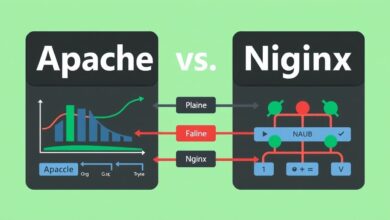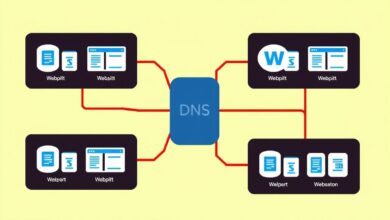Choosing the Right Path: Understanding Different Web Hosting Options (Shared, VPS, Dedicated)

Launching a website is an exciting venture, but one of the first crucial decisions you’ll face is selecting the right foundation: your web hosting. With various web hosting options available, it can feel overwhelming. Choosing incorrectly can lead to frustratingly slow load times, security vulnerabilities, or unnecessary expenses. This guide will demystify the three core types – Shared, VPS, and Dedicated hosting – helping you understand their differences and choose the best fit for your online presence.
Think of web hosting as renting space on the internet for your website’s files (code, images, text). A web server is a powerful computer that stores these files and makes them accessible to visitors worldwide. The type of hosting determines how much server space and resources you get, and who you share them with.
[Hint: Insert image/video explaining the concept of web hosting here]Shared Hosting: The Budget-Friendly Starter Pack
Shared hosting is the most common and affordable entry point into the world of web hosting. As the name suggests, your website shares a single physical server – and its resources like CPU power, RAM, and disk space – with numerous other websites.
Imagine living in an apartment building; you share the building’s infrastructure (plumbing, electricity) with other residents. Similarly, on shared hosting, websites share the server’s resources.
Pros of Shared Hosting:
- Cost-Effective: It’s the cheapest option, making it ideal for beginners, personal blogs, or small businesses with tight budgets. Prices often start at just a few dollars per month.
- User-Friendly: Hosting providers typically manage the server maintenance, security updates, and technical aspects. Control panels like cPanel or Plesk offer an easy-to-use interface for managing your website files and domains.
- No Technical Expertise Required: Perfect for those who aren’t tech-savvy and just want to get their site online quickly.
Cons of Shared Hosting:
- Performance Issues (“Noisy Neighbors”): Since resources are shared, a sudden traffic surge or resource-heavy script on another website on the same server can slow down *your* website.
- Limited Resources & Control: You have restricted access to server settings and limited resources allocated to your site. Custom software installation is often prohibited.
- Potential Security Risks: Although providers implement security measures, a security breach on one website could potentially affect others on the same server.
Best for: Small websites, personal blogs, portfolios, startups, and businesses with low traffic expectations and minimal customization needs.
VPS Hosting: The Flexible Middle Ground
VPS (Virtual Private Server) hosting offers a significant step up from shared hosting. While you still share a physical server with others, virtualization technology divides that server into multiple, isolated virtual compartments. Each compartment acts like its own private server with dedicated resources (CPU, RAM, disk space) allocated specifically to your website.
Think of it like owning a townhouse; you share the land, but you have your own defined space, walls, and utilities, offering more privacy and control than an apartment.
Pros of VPS Hosting:
- Guaranteed Resources: Your website’s performance isn’t affected by other users on the server because your resources are dedicated.
- Increased Control & Customization: You typically get root access, allowing you to install custom software, configure server settings, and have greater control over your hosting environment.
- Better Scalability: VPS plans often allow easy scaling of resources (RAM, CPU) as your website traffic grows.
- Enhanced Security: The isolated environment provides better security compared to shared hosting.
Cons of VPS Hosting:
- Higher Cost: More expensive than shared hosting, although significantly cheaper than dedicated options.
- Requires Technical Knowledge: Managing a VPS (even a managed one) requires more technical understanding than shared hosting. Unmanaged VPS requires significant server administration skills.
Best for: Growing websites, online stores (eCommerce), businesses experiencing increased traffic, developers needing flexibility, and sites that have outgrown shared hosting.
For more details on server resources, check out this explanation of server resources.
[Hint: Insert image/video comparing Shared vs VPS architecture here]Dedicated Hosting: The Ultimate Powerhouse
Dedicated hosting represents the pinnacle of web hosting options. With this plan, you lease an entire physical server exclusively for your website(s). All the server’s resources – CPU, RAM, storage, bandwidth – are solely yours. You don’t share with anyone.
This is like owning a detached house; you have complete control over the property, resources, and security, with no neighbors directly impacting your space.
Pros of Dedicated Hosting:
- Maximum Performance & Reliability: Unrivaled speed and uptime as all server resources are dedicated to your site(s).
- Full Control & Customization: Complete root access allows you to configure the server exactly to your specifications, install any software, and optimize the environment.
- Highest Level of Security: You control the security protocols and aren’t vulnerable due to the activities of other website owners. Ideal for handling sensitive data.
Cons of Dedicated Hosting:
- Most Expensive Option: Dedicated servers come with a significantly higher price tag compared to shared and VPS hosting.
- Requires Advanced Technical Skills: You are typically responsible for all server management, including software updates, security patches, and troubleshooting, unless you opt for a more expensive managed dedicated plan.
Best for: Large corporations, high-traffic websites, demanding web applications, eCommerce stores with large catalogs, government agencies, and businesses requiring maximum control and security.
Quick Comparison: Shared vs. VPS vs. Dedicated
Here’s a table summarizing the key differences between these core web hosting options:
| Feature | Shared Hosting | VPS Hosting | Dedicated Hosting |
|—————|—————-|——————————|——————–|
| Cost | Lowest | Moderate | Highest |
| Performance | Variable (Low) | Stable (Medium-High) | Highest |
| Resources | Shared | Dedicated (within partition) | Fully Dedicated |
| Control | Limited | High (Root Access Typical) | Full Root Access |
| Security | Basic | Enhanced Isolation | Maximum Control |
| Technical Skill| None/Basic | Intermediate | Advanced |
Making the Right Choice
Selecting the right hosting plan depends entirely on your specific needs:
- Starting Small/Budget-Conscious? Shared hosting is likely your best bet.
- Outgrowing Shared/Need More Control? VPS hosting offers a scalable and powerful upgrade.
- Mission-Critical Site/High Traffic/Need Full Control? Dedicated hosting provides the ultimate power and security.
Consider your budget, expected website traffic, technical expertise, and future growth plans when evaluating these web hosting options. Don’t forget that many providers allow you to easily upgrade your plan as your needs evolve. If you need help with website migration, check out our guide here.
By understanding the fundamentals of shared, VPS, and dedicated hosting, you can make an informed decision and set your website up for success from day one.




